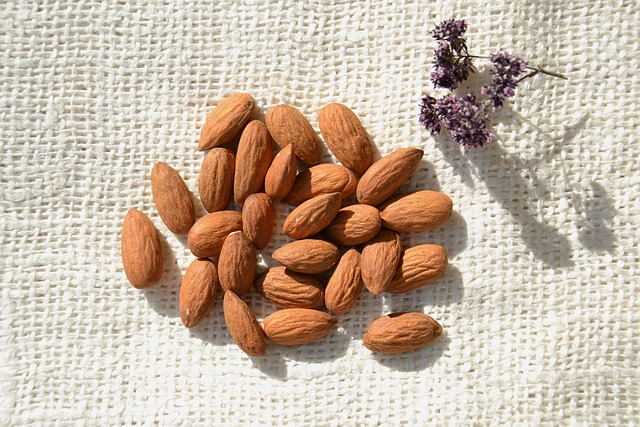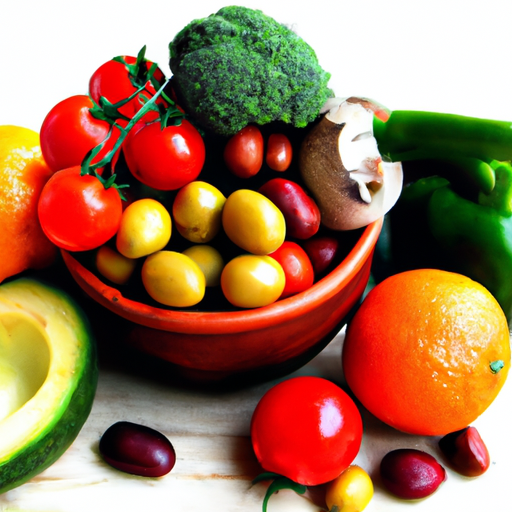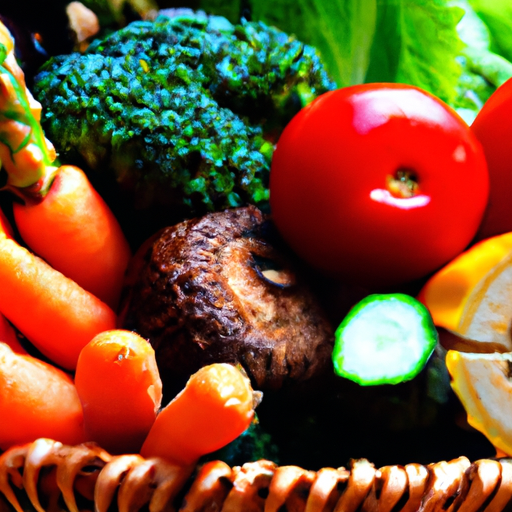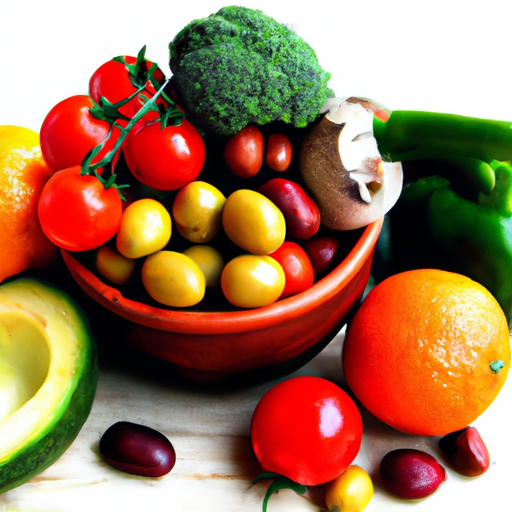So, you’ve decided to go vegetarian. That’s great! Whether it’s for ethical reasons, health benefits, or simply a personal preference, adopting a vegetarian diet can be a positive change. However, it’s important to make sure you’re still getting all the necessary nutrients your body needs. While a well-planned vegetarian diet can provide all the essential nutrients, there are a few key ones that you need to pay special attention to. In this article, we’ll take a closer look at some of the nutrients you might be missing out on in a vegetarian diet and how to ensure you’re getting enough of them. So, keep reading to find out more!
One nutrient that vegetarians often need to be mindful of is protein. Animal products are typically high in protein, so when you cut them out of your diet, you need to find alternative sources to meet your protein needs. Luckily, there are plenty of plant-based protein sources such as beans, lentils, tofu, tempeh, and quinoa. It’s important to include a variety of these protein-rich foods in your meals to ensure you’re getting all the essential amino acids your body needs.
Another nutrient that vegetarians might be lacking is vitamin B12. This essential vitamin is primarily found in animal products, so it can be harder for vegetarians to obtain. However, there are certain foods that are fortified with B12, such as plant-based milks, breakfast cereals, and nutritional yeast. Additionally, you may also consider taking B12 supplements to ensure you’re meeting the recommended daily intake.
Iron is another nutrient that vegetarians should keep an eye on. While plant-based sources of iron do exist, it’s worth noting that they’re not as readily absorbed by the body compared to iron from animal products. Therefore, it’s important to increase your intake of iron-rich foods and consume them alongside vitamin C-rich foods, as vitamin C enhances iron absorption. Some good plant-based sources of iron include spinach, lentils, tofu, pumpkin seeds, and fortified breakfast cereals.
In conclusion, transitioning to a vegetarian diet can offer numerous benefits for your health and the environment, but it’s essential to be aware of the potential nutrients you might be missing out on. By planning your meals carefully and incorporating a variety of nutrient-rich foods, you can ensure that you’re meeting your body’s needs. In the next article, we’ll provide more specific tips and guidance on how to get these vital nutrients in a vegetarian diet, so stay tuned for that! While a vegetarian diet can provide many health benefits, it is important to be mindful of potential nutrient deficiencies that can occur when certain foods are eliminated. In this article, we will explore the key nutrients that you might be missing out on in a vegetarian diet, and how you can ensure that your diet remains balanced and nutritionally adequate.

Protein
Protein is an essential nutrient needed for growth, repair, and maintenance of tissues in the body. While many people associate protein with animal products, there are plenty of plant-based sources of protein that can easily be incorporated into a vegetarian diet. Foods such as beans, lentils, tofu, tempeh, quinoa, and nuts and seeds are all excellent sources of plant-based protein.
To meet your daily protein needs, it is recommended to consume about 0.8 grams of protein per kilogram of body weight. However, if you engage in regular physical activity or have special dietary needs, you may need to adjust your protein intake accordingly. It is important to note that vegetarian diets, especially vegan diets, may require more careful planning to ensure adequate protein consumption.
Potential protein deficiencies can occur in a vegetarian diet if there is a lack of variety or if the diet is heavily reliant on processed foods. Therefore, it is important to include a wide variety of plant-based protein sources in your diet to ensure you are meeting your protein needs.
Iron
Iron is a crucial mineral that plays a vital role in carrying oxygen throughout the body. While iron is commonly found in animal products, there are also plant-based sources of iron that can be included in a vegetarian diet. Foods such as dark leafy greens, legumes, tofu, fortified cereals, and dried fruits are all good plant-based sources of iron.
To enhance iron absorption in a vegetarian diet, it is recommended to consume iron-rich foods alongside foods high in vitamin C. Vitamin C enhances the absorption of iron from plant sources, so incorporating foods such as citrus fruits, strawberries, bell peppers, and tomatoes can help maximize iron absorption.
Potential iron deficiencies can occur in a vegetarian diet if iron-rich foods are not consumed in sufficient quantities or if there is poor absorption due to lack of vitamin C-rich foods. Regular blood tests and possibly iron supplementation may be necessary to ensure adequate iron levels in the body.
Calcium
Calcium is essential for maintaining strong and healthy bones, as well as for proper muscle and nerve function. While dairy products are commonly associated with calcium, there are also several plant-based sources of calcium that can be included in a vegetarian diet. Foods such as leafy greens, fortified plant milks, tofu, almonds, sesame seeds, and fortified orange juice are all great plant-based sources of calcium.
The recommended daily intake of calcium for adults is 1000-1200 milligrams. However, it is important to note that not all calcium is absorbed equally, so it is recommended to consume calcium-rich foods throughout the day rather than all at once. Additionally, to enhance calcium absorption, it is important to maintain adequate vitamin D levels in the body.
Potential calcium deficiencies can occur in a vegetarian diet if calcium-rich foods are not consumed in sufficient quantities or if there is poor absorption due to inadequate vitamin D levels. Regular blood tests and possibly calcium supplementation may be necessary to ensure adequate calcium levels in the body.
Vitamin B12
Vitamin B12 is essential for proper nervous system function and the production of red blood cells. Unfortunately, vitamin B12 is primarily found in animal products, making it a common nutrient of concern for vegetarians and vegans. While there are no plant-based sources of vitamin B12, fortified foods such as plant milks, breakfast cereals, and nutritional yeast can provide a source of this important nutrient for vegetarians.
The recommended daily intake of vitamin B12 for adults is 2.4 micrograms. However, it is important to note that most vitamin B12 supplements are derived from animal sources, so if you follow a strict vegan diet, it is recommended to choose a supplement that is specifically labeled as vegan.
Potential vitamin B12 deficiencies can occur in a vegetarian diet, particularly among vegans or those who do not consume fortified foods. Regular blood tests and possibly vitamin B12 supplementation may be necessary to ensure adequate vitamin B12 levels in the body.

Omega-3 Fatty Acids
Omega-3 fatty acids are crucial for heart health and have been associated with numerous health benefits, including reducing inflammation and improving cognitive function. While fatty fish is often touted as the best source of omega-3 fatty acids, there are also plant-based sources that can be included in a vegetarian diet.
Flaxseeds, chia seeds, hemp seeds, walnuts, and algae-based supplements are all excellent sources of plant-based omega-3 fatty acids. It is recommended to consume omega-3 fatty acids from a variety of sources to ensure you are getting the different types of omega-3s that your body needs.
The recommended daily intake of omega-3 fatty acids varies depending on age, sex, and specific health conditions. However, it is generally recommended to aim for 250-500 milligrams of combined EPA and DHA, the two most beneficial forms of omega-3 fatty acids.
Potential omega-3 fatty acid deficiencies can occur in a vegetarian diet if these plant-based sources are not consumed in sufficient quantities. Regular blood tests and possibly omega-3 fatty acid supplementation may be necessary to ensure adequate levels of these essential fatty acids in the body.
Zinc
Zinc is essential for immune function, DNA synthesis, and wound healing. While zinc is commonly found in animal products, there are also plant-based sources of zinc that can be included in a vegetarian diet. Foods such as legumes, whole grains, nuts, seeds, and tofu are all good plant-based sources of zinc.
The recommended daily intake of zinc for adults is 8-11 milligrams, depending on sex and life stage. It is important to note that phytic acid, found in some plant foods, can inhibit zinc absorption. Therefore, it is recommended to choose zinc-rich plant-based foods that have been soaked, fermented, or sprouted to reduce phytic acid content.
Potential zinc deficiencies can occur in a vegetarian diet if zinc-rich foods are not consumed in sufficient quantities or if there is poor absorption due to high phytic acid intake. Regular blood tests and possibly zinc supplementation may be necessary to ensure adequate zinc levels in the body.

Vitamin D
Vitamin D is essential for bone health and plays a role in immune function. While the sun is the best source of vitamin D, it can be challenging for vegetarians who may spend less time outdoors or live in areas with limited sunlight. However, there are also some plant-based sources of vitamin D that can be included in a vegetarian diet.
Portobello mushrooms, fortified plant milks, fortified orange juice, and some types of algae are all plant-based sources of vitamin D. However, it is important to note that these sources may not provide sufficient amounts of vitamin D, especially during the winter months or for those with limited sun exposure.
The recommended daily intake of vitamin D varies depending on age and life stage. However, it is generally recommended to aim for 600-800 international units (IU) per day.
Potential vitamin D deficiencies can occur in a vegetarian diet if adequate sun exposure or fortified foods are not included in the diet. Regular blood tests and possibly vitamin D supplementation may be necessary to ensure adequate vitamin D levels in the body.
Iodine
Iodine is essential for proper thyroid function and the production of thyroid hormones. While iodine is commonly found in seafood, there are also plant-based sources of iodine that can be included in a vegetarian diet. Foods such as seaweed, iodized salt, and some types of vegetables can provide a source of iodine.
The recommended daily intake of iodine for adults is 150 micrograms. However, it is important to note that excessive iodine intake can also be harmful, so it is recommended to obtain iodine from natural food sources rather than relying solely on iodized salt.
Potential iodine deficiencies can occur in a vegetarian diet if iodine-rich foods are not consumed in sufficient quantities. Regular blood tests and possibly iodine supplementation may be necessary to ensure adequate iodine levels in the body.
Vitamin C
Vitamin C is essential for immune function, wound healing, and the production of collagen. While vitamin C is commonly associated with citrus fruits, there are also several plant-based sources of vitamin C that can be included in a vegetarian diet. Foods such as oranges, strawberries, kiwi, bell peppers, and broccoli are all excellent sources of vitamin C.
The recommended daily intake of vitamin C for adults is 75-90 milligrams for women and 90-120 milligrams for men. However, it is important to note that vitamin C is water-soluble, meaning it is not stored in the body and needs to be replenished regularly.
Potential vitamin C deficiencies can occur in a vegetarian diet if vitamin C-rich foods are not consumed in sufficient quantities or if they are overcooked, as vitamin C is sensitive to heat. Regular blood tests and possibly vitamin C supplementation may be necessary to ensure adequate vitamin C levels in the body.
Conclusion
In conclusion, while a vegetarian diet can offer many health benefits, it is important to be mindful of potential nutrient deficiencies that can occur when certain foods are eliminated. Protein, iron, calcium, vitamin B12, omega-3 fatty acids, zinc, vitamin D, iodine, and vitamin C are all nutrients that can be of concern in a vegetarian diet.
To ensure you are meeting your nutrient needs, it is important to include a variety of plant-based foods that provide these key nutrients. Additionally, regular blood tests and possibly dietary supplements may be necessary to ensure adequate nutrient levels in the body.
If you have any concerns about meeting your nutrient needs on a vegetarian diet, it is always recommended to consult with a healthcare professional or registered dietitian who can provide personalized guidance and support. By being mindful of your nutrient intake and making informed food choices, you can maintain a balanced and nutritionally adequate vegetarian diet.
